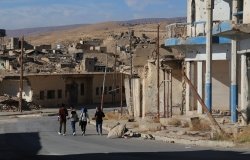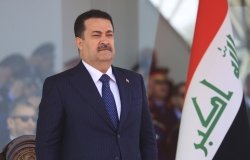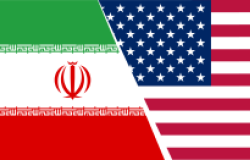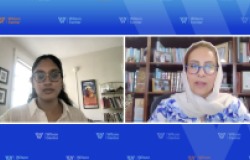Hypothetical Herzog
What an Israeli government will look like if Bibi Netanyahu loses the election to the Labor Party candidate -- and what it could accomplish according to Aaron David Miller.
Barely a month ago, it would have been impossible for most Israelis to imagine a political landscape without Benjamin Netanyahu, the smart, savvy pol who has dominated the Israeli political stage for more than a decade.
Now, 72 percent of Israelis in a recent poll said they believe Israel needs a change in leadership. And those final polls (if they hold — a big if) suggest a lead big enough that it could give Bibi’s rival — the 54-year-old head of the Labor party, Isaac “Bougie” Herzog, son of Chaim Herzog, Israel’s sixth president — a chance to form the next government.
But how much would a Herzog government really matter? How much would he, as a newly minted prime minister, even be able to transform issues relating to Israel’s foreign policy, particularly the Palestinian issue?
After six years of Likud governance, the contrast of a possible Labor-led government will seem striking. But there’s also a pretty good chance that rather than a revolutionary or profound transformation of Israeli policies, Herzog’s approach will more represent a smart transaction.
Much will depend on the coalition Herzog would assemble. But assuming he trounces Bibi and takes the election, here’s how a hypothetical Herzog government might come down on the issues.
Relations With Washington
If Herzog does form the next Israeli government, the champagne corks will be popping at 1600 Pennsylvania and Foggy Bottom. There will be cosmic relief that both Netanyahu and Washington ambassador Ron Dermer are gone. Indeed, the U.S.-Israeli relationship may well be the biggest beneficiary of a Labor victory — in large part because Herzog believes the relationship is central to Israel’s security. Indeed, the U.S.-Israeli relationship may well be the biggest beneficiary of a Labor victory — in large part because Herzog believes the relationship is central to Israel’s security. Once he’s in charge, no more Israeli interventions in American politics, nasty public fights, and “chickenshit” backgrounders by Obama officials, largely because there won’t be need or reason for these kinds of antics on either side. Things won’t be perfect, but they will be on a much more even keel.
In short, the divides will be better managed and less noisy, and the prospects of serious cooperation — even on the peace process — enhanced. On both the personal and policy fronts, the roller-coaster soap opera relationship that has existed these last six years between the U.S. president and the Israeli prime minister will end.
Peace Process
Anybody looking for quick and easy breakthroughs with the Palestinians should take a deep breath and lie down until the feeling passes. Herzog will need time to establish himself, his coalition partners are likely to lean more to the right on the peace issue than he does, and the gaps on core final-status issues, such as Jerusalem and refugees, will not be easily bridged. Indeed, not surprisingly, Herzog himself has called Jerusalem the eternal capital of the state of Israel. Moreover, the Palestinians won’t give up their international campaign to pressure Israel at the International Criminal Court (ICC) unless and until they see whether Herzog will move in their direction on the big negotiation issues.
U.S. Secretary of State John Kerry may be eager to get back on a plane and mediate. But right now, he’s likely to produce more process than peace. That would be a good thing if the negotiations were serious. But it would be foolish for Kerry to risk a new government’s credibility (and his own) and resume high-profile negotiations unless the Israelis and Palestinians are ready to make decisions. Testing privately, quietly, and patiently makes more sense. And letting Herzog and Mahmoud Abbas see if they can work out some smaller confidence-building measures and keep Israeli-Palestinian security cooperation on track does too.
Settlements
Herzog has already said that he would limit settlement activity to the blocs that Israel would keep in exchange for land swaps with the Palestinians. This may not satisfy the Palestinians. But there’s little doubt that Herzog will try to defuse tensions with Washington on this issue. There won’t be a comprehensive freeze, either in the West Bank or in Jerusalem. Indeed, at the Munich Security Conference, Herzog ducked the issue. But there’s no doubt that for Herzog the settlements issue isn’t ideological, and he’ll try to reduce expenditures on settlements both for peace process reasons and because Israel can redirect funds to pressing social and economic needs. And Herzog will work hard to avoid high-profile building projects, such as E-1, and building in sensitive areas in East Jerusalem.
Iran
Herzog has consistently attacked Netanyahu’s high-wire act on Iran — i.e., his speech to Congress, and his interference in U.S. domestic politics — and recently argued that an agreement could be reached to protect Israeli interests, one that would contain ironclad assurances. Any new prime minister will remain highly skeptical of Iran’s intentions. But the ground will shift from Netanyahu’s almost messianic conception of the threat to a more measured one designed to deal not only with what’s desirable on the nuclear issue, but what’s possible. Indeed, Herzog said over the weekend that he and Netanyahu agree on the threat but not on “the way” to deal with it. Unlike Netanyahu, Herzog has greater trust in the United States — misplaced or not — to take the lead on the Iran issue and to negotiate an accord that is acceptable to Israel.
A U.S.-Iranian nuclear deal might actually be reached during the next few weeks, right in the middle of coalition negotiations. And that might toughen up Herzog’s response. But clearly Herzog is much more open to a deal and tends to trust the Americans more than Netanyahu when it comes to one. As with the settlement issue, differences will remain, but under a Herzog government, the public bluster and fight will give way to a quieter dialogue with Washington, one that contains and perhaps even resolves some of those differences.
To be a sucker — or, in Yiddish, a friar — is the kiss of death in Israeli politics. And in the case of Herzog — a yeled tov or a good boy — it’s essentially the same thing and will bring about the same fatal (political) outcome. Nahum Barnea, one of Israel’s most respected journalists, told Tablet that Herzog “projects the image of a goodie two-shoes.”
Herzog will never be the tough guy. Indeed, his boyish image and physical persona (slight and short) leaves him without the commanding experience of a Rabin or a Sharon. But if he’s to survive, he must project an image of a pragmatic hawk — tough and realistic on peace and Iran, but prudent and wise too. No doubt, some security crisis will emerge soon enough to test him. And it’s vital to get a good national security team, not as props, but with reputations and credibility the public believes in.
It’s impossible to predict what kind of leader Herzog will be and how he might rise (or not) to the enormous challenges Israel faces. He may also have handicapped himself. Indeed, there’s the curious matter of Herzog’s arrangement with his Zionist Union partner Tzipi Livni to rotate the prime ministry to her after two years. He cut this deal to secure her support and seats and to project an image of a broader front with a centrist partner at a time when Labor had only 15 seats. But how he can keep this deal and expect to build credibility for himself is unclear. If he does, he may be regarded a lame duck even before his term begins. There are reports that Livni has agreed to drop the rotation to bolster chances for the Zionist Union in Tuesday’s elections. We’ll see how this eventually plays out. Add to this the fragmented nature of Israeli politics and the challenges of managing a coalition that could include rightist, secular, and Orthodox parties and one can only wonder how he’ll fare.
Still, after years of drift and dysfunction, Israelis appear to want a change. Herzog may or may not prove to be a charismatic transformer. But he may be able to set a new direction for a remarkable country that’s in need of one on some critically important issues. (He said as much in an address to the Saban Forum in Washington in December.)
Indeed, it may be in the end that if Israelis turn Netanyahu out, it won’t be primarily out of their love of Herzog. More likely, looking around at their situation, enough Israelis may well conclude that while Herzog is not their savior, maybe he can make things a little better. Quite simply, if you think you’re in something of a hole, the first order of business is to stop digging.
The opinions expressed here are solely those of the author.
About the Author


Middle East Program
The Wilson Center’s Middle East Program serves as a crucial resource for the policymaking community and beyond, providing analyses and research that helps inform US foreign policymaking, stimulates public debate, and expands knowledge about issues in the wider Middle East and North Africa (MENA) region. Read more









